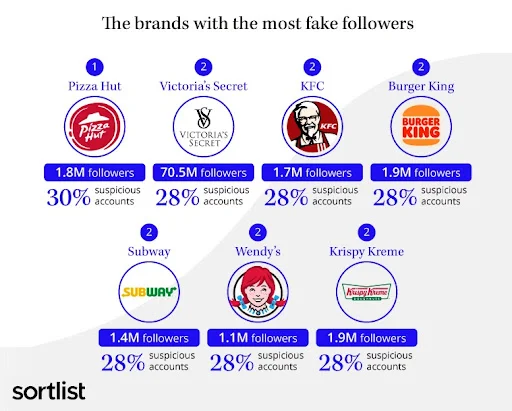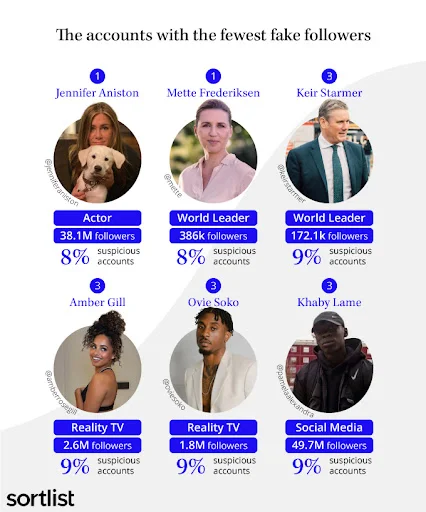A recent study shows just how much fake followers and bot accounts have permeated social media platforms, with many of them accounting for the rise of famous figures on said platforms.
When past generations talked about the rise of AI, the future they imagined was probably not quite so…dumb. They imagined something akin to the Terminator, The Matrix, maybe Minority Report. When we think of Artificial Intelligence, we naturally expect something more intelligent and less artificial. Yet, what we ended up with is bot accounts being paid for by influencers. If there was ever a singular moment in time where I could point out my deep, immeasurable disappointment with the world as a whole began, I’d probably look at when the first bot account was made.
Bots are annoying at best and harmful at worst for any number of reasons. They spam comment sections with useless, copy paste garbage. They often attach links to malicious websites that end up being fronts for mass phishing attacks. Much more relevant to our topic at hand, however, is that they are used to bolster the follower counts for individuals trying to make it big as an online celebrity and/or influencer. The commentary about fake online personas being defined by a fake following more or less writes itself, but that isn’t what we’re discussing. What we’re really delving into is just how prevalent bots are across social media.
Approximately 26% of all social media accounts can be attributed to bots. Their effect at creating a fake atmosphere of success and attention is further embellished by the fact that most of these accounts are all concentrated towards accounts with the highest of followings. Celebrities such as Ariana Grande or Nicki Minaj are examples of celebrity accounts that are haunted by bots. However, the overall impact here is not all too significant. Celebrities already have mass followings before they join platforms, and 26% of millions of followers still leaves a large authentic audience to work with. The real problems are encountered at the level of relatively little-known influencers. Since influencers are often called upon by brands and the like for advertisements or sponsored content, a fake following here means that money is being wasted.
Influencers obviously won’t declare whether or not their followers are fake. Therefore, it falls upon current brands and business owners to more carefully investigate who they’re calling upon to promote products. Chances are that the audience they’re promoting to isn’t the most responsive. Or human.
Take a look at below charts and infographic, which comes courtesy of SortList, for more insights:
Read next: Phubbing! The term may be new but there are chances that you are one of them too
When past generations talked about the rise of AI, the future they imagined was probably not quite so…dumb. They imagined something akin to the Terminator, The Matrix, maybe Minority Report. When we think of Artificial Intelligence, we naturally expect something more intelligent and less artificial. Yet, what we ended up with is bot accounts being paid for by influencers. If there was ever a singular moment in time where I could point out my deep, immeasurable disappointment with the world as a whole began, I’d probably look at when the first bot account was made.
Bots are annoying at best and harmful at worst for any number of reasons. They spam comment sections with useless, copy paste garbage. They often attach links to malicious websites that end up being fronts for mass phishing attacks. Much more relevant to our topic at hand, however, is that they are used to bolster the follower counts for individuals trying to make it big as an online celebrity and/or influencer. The commentary about fake online personas being defined by a fake following more or less writes itself, but that isn’t what we’re discussing. What we’re really delving into is just how prevalent bots are across social media.
Approximately 26% of all social media accounts can be attributed to bots. Their effect at creating a fake atmosphere of success and attention is further embellished by the fact that most of these accounts are all concentrated towards accounts with the highest of followings. Celebrities such as Ariana Grande or Nicki Minaj are examples of celebrity accounts that are haunted by bots. However, the overall impact here is not all too significant. Celebrities already have mass followings before they join platforms, and 26% of millions of followers still leaves a large authentic audience to work with. The real problems are encountered at the level of relatively little-known influencers. Since influencers are often called upon by brands and the like for advertisements or sponsored content, a fake following here means that money is being wasted.
Influencers obviously won’t declare whether or not their followers are fake. Therefore, it falls upon current brands and business owners to more carefully investigate who they’re calling upon to promote products. Chances are that the audience they’re promoting to isn’t the most responsive. Or human.
Take a look at below charts and infographic, which comes courtesy of SortList, for more insights:
Read next: Phubbing! The term may be new but there are chances that you are one of them too






